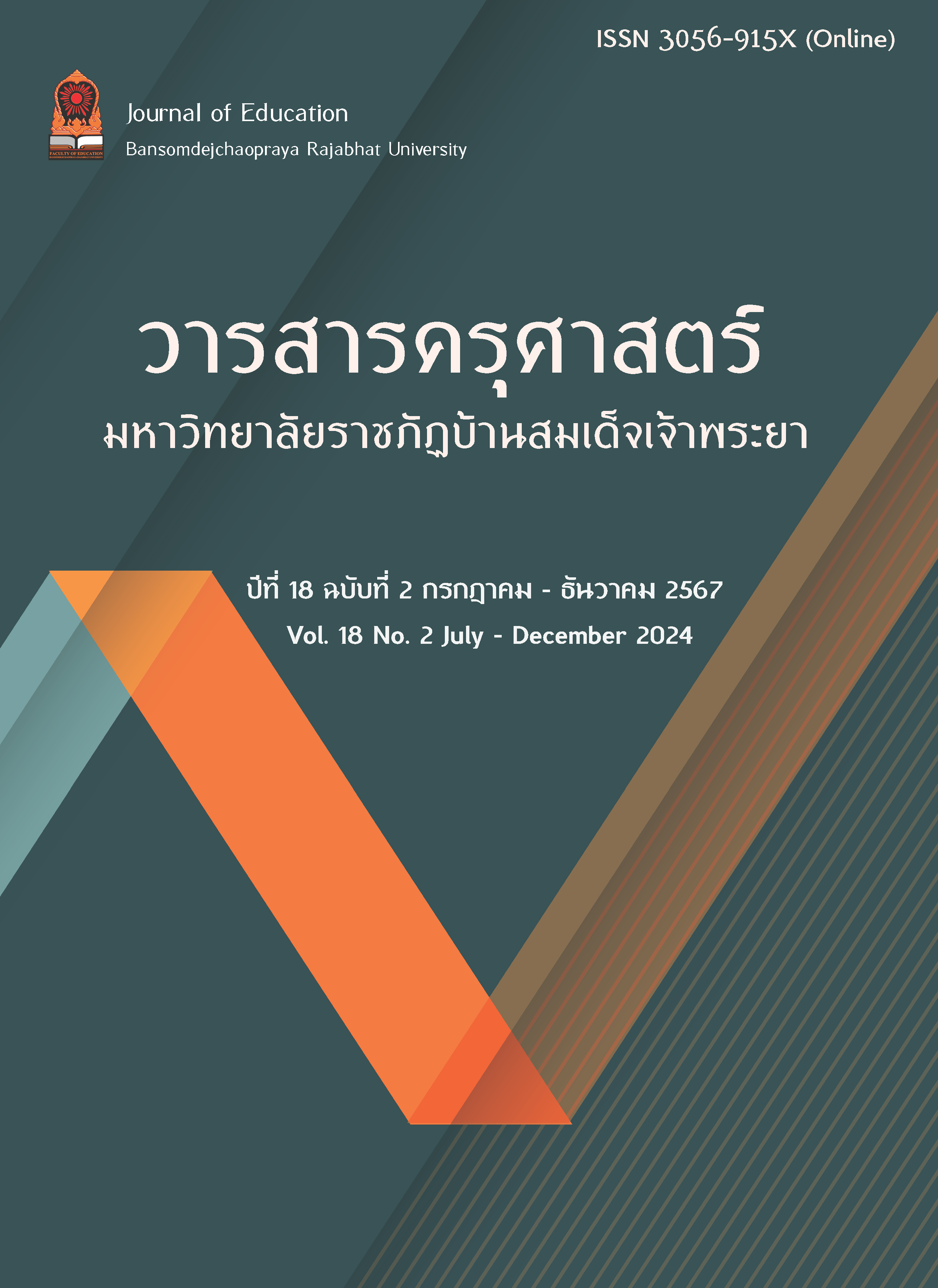Using Active Learning Activities Management to Promote English Communication Skills in English Teaching Literature for English Training Teachers
Keywords:
Active Learning Activities, English communication skillsAbstract
The objectives of this research were 1) to develop communication skills in the field of literature for teaching English through the use of active learning activities, and 2) to study the students' satisfaction with the use of active learning activities. The sample group, selected purposively, consisted of 10 fourth-year student teachers majoring in English, who were conducting teaching in schools located in Lamphun and Lampang provinces. The research instruments were pre- and post-tests on learning achievement using the active learning activities model, and a satisfaction questionnaire. The data were analyzed using descriptive statistics, including mean, percentage, standard deviation, and dependent t-test.
The research findings were: 1) The learning achievement of communication skills in literature for teaching English among the student teachers improved. The average pre-test score was x̅ = 29.70, S.D. = 5.17), and the average post-test score was ( x̅ = 52.20, S.D. = 2.74). Although the overall pre-test achievement score of 49.50% was at the failing level, the overall post-test achievement score of 87% was at the good level. The post-test was significantly higher than the pre-test at the .01 significance level, with an increase in the average score of 22.50.
2) The overall satisfaction of students with the active learning activities was at a high level, with an average score of (x̅ = 4.38, S.D. = 0.63). When considering specific activities, the highest satisfaction was found in the puppet theater activity ( x̅ = 4.70, S.D. = 0.48) and the activities of storytelling, short story reading, and poetry reading voice ( x̅ = 4.60, S.D. = 0.52). Meanwhile, other activities at a high satisfaction level included summarizing literature through presentations ( x̅ = 4.50, S.D. = 0.71) and English poster Q&A activities ( x̅ = 4.40, S.D. = 0.52)
Downloads
References
กระทรวงศึกษาธิการ. (2551). หลักสูตรแกนกลางการศึกษาชั้นพื้นฐาน พุทธศักราช 2551. กรุงเทพมหานคร: โรงพิมพ์ชุมนุมสหกรณ์การเกษตรแห่งประเทศไทย.
บุปผา รื่นรวย, สถาพร สังข์ขาวสุทธิรักษ์ , และชูศักดิ์ เอกเพชร. (2563). การพัฒนาการจัดการเรียนรู้ เชิงรุกโดยใช้กระบวนการนิเทศสำหรับครูในโรงเรียนประชานิคม 4 สังกัดสำนักงานเขตพื้นที่การศึกษาประถมศึกษาชุมพร เขต 1. บัณฑิตวิทยาลัย. สุราษฎร์ธานี: มหาวิทยาลัยราชภัฏสุราษฎร์ธานี. สืบค้นจาก http://ir.sru.ac.th/handle/123456789/761
ปรียาภา วังมณี. (2565). ความตระหนักในคุณค่าและทัศนคติในการเรียนวรรณกรรมภาษาอังกฤษของนักศึกษาระดับปริญญาตรี (หลักสูตรนานาชาติ). วารสารมังรายสาร. มหาวิทยาลัยราชภัฏเชียงราย, 10(1), 15-29.
ปวีณา แย้มใส. (2565, กรกฎาคม-ธันวาคม). การประยุกต์ใช้การจัดการเรียนรู้แบบกระตือรือร้น (Active Learning) ในการเรียนการสอนภาษาอังกฤษ. วารสาร มจร ภาษาและวัฒนธรรม. มหาวิทยาลัยมหาจุฬาลงกรณราชวิทยาลัย, 1(2), 29-41.
ปัญชลี วาสนสมสิทธิ์. (ม.ป.ป.). การใช้วรรณคดีในชั้นเรียนภาษาอังกฤษเพื่อสร้างความเข้าใจทางวัฒนธรรมของเจ้าของภาษา. กรุงเทพฯ: สืบค้นจาก
https://www.culi.chula.ac.th/publicationsonline/files/article2/xg4TrxQnfrMon43758.pdf
รัตนชนก รัตนภูมิ. (2564, กรกฎาคม-ธันวาคม). การพัฒนารูปแบบการนิเทศแบบหน้างานเพื่อส่งเสริมการจัดการเรียนรู้เชิงรุก (Active Learning) สำหรับครูสังกัดสำนักงานเขตพื้นที่การศึกษาประถมศึกษานครสวรรค์ เขต 3. วารสารศึกษาศาสตร์ มหาวิทยาลัยทักษิณ, 21(2), 1-3. สืบค้นจาก https://so02.tci-thaijo.org/index.php/eduthu/article/view/243329/170532
รัตนา กลิ่นจุ้ย และวาสนา จักรแก้ว. (2561, ตุลาคม-ธันวาคม). การจัดการเรียนรู้วิชาภาษาอังกฤษเพื่อทักษะการเรียนกับการเรียนรู้แบบลงมือปฏิบัติสำหรับผู้เรียนกลุ่มเจเนอเรชั่น Z. วารสารศึกษาศาสตร์ มหาวิทยาลัยนเรศวร. 22(4), 199-200.
วาทิตพันธ์ มาตมูล และ สุกัญญา เกาะวิวัฒนากุล. (2561, กรกฎาคม-ธันวาคม). ทัศนคติต่อการพัฒนาทักษะการใช้ความคิดเชิงวิจารณญาณในการเรียนวรรณคดีของผู้เรียนภาษาอังกฤษเป็นภาษาต่างประเทศในระดับมหาวิทยาลัย. วารสารมังรายสาร มหาวิทยาลัยพะเยา, 6(2), 97-111. สืบค้นจาก https://so04.tci- thaijo.org/index.php/mrsj/article/view/176162/125754
วิจิตร ศรีสอ้าน. (2561, สิงหาคม). บรรยายพิเศษ การเรียนการสอนและการใช้ภาษาอังกฤษในยุคไทยแลนด์ 4.0. มหาวิทยาลัยวลัยลักษณ์. สืบค้นจาก https://www.wu.ac.th/th/news/14259
อนุสิษฐ์ พันธ์กล่ำ, ธารณา สุวรรณเจริญ และชลชลิตา แตงนารา.(2560, ธันวาคม). ผลการใช้การเรียนรู้เชิงรุก (Active Learning) เพื่อส่งเสริมทักษะการพูดภาษาอังกฤษสำหรับนักศึกษาวิชาชีพครู. รายงานสืบเนื่องการประชุมวิชาการระดับชาติ สถาบันวิจัยและพัฒนา มหาวิทยาลัยราชภัฏกำแพงเพชร. (4), 562 - 570. สืบค้นจาก https://research.kpru.ac.th/sac/additional.php?id=181
อรรชนิดา หวานคง. (2559, กรกฎาคม-ธันวาคม). การจัดการเรียนการสอนภาษาอังกฤษในศตวรรษที่ 21. วารสารสถาบันวิจัยญาณสังวร มหาวิทยาลัยมหามงกุฎราชวิทยาลัย, 7(2), 303-313. สืบค้นจาก https://so04.tci-thaijo.org/index.php/yri/article/view/184935/130126
Little Wood, William. (1983). Foreign and second language learning: Language acquisition research and its implications for the classroom. Cambridge: Cambridge University Press.Reid,
Downloads
Published
How to Cite
Issue
Section
License
Copyright (c) 2024 Faculty of Educaion Bansomdejchaopraya Rajabhat University

This work is licensed under a Creative Commons Attribution-NonCommercial-NoDerivatives 4.0 International License.
บทความที่ได้รับการตีพิมพ์เป็นลิขสิทธิ์ของคณะครุศาสตร์ มหาวิทยาลัยราชภัฏบ้านสมเด็จเจ้าพระยา
ข้อความที่ปรากฏในบทความแต่ละเรื่องในวารสารวิชาการเล่มนี้เป็นความคิดเห็นส่วนตัวของผู้เขียนแต่ละท่านไม่เกี่ยวข้องกับมหาวิทยาลัยราชภัฏบ้านสมเด็จเจ้าพระยา และคณาจารย์ท่านอื่นๆในมหาวิทยาลัยฯ แต่อย่างใด ความรับผิดชอบองค์ประกอบทั้งหมดของบทความแต่ละเรื่องเป็นของผู้เขียนแต่ละท่าน หากมีความผิดพลาดใดๆ ผู้เขียนแต่ละท่านจะรับผิดชอบบทความของตนเอง



